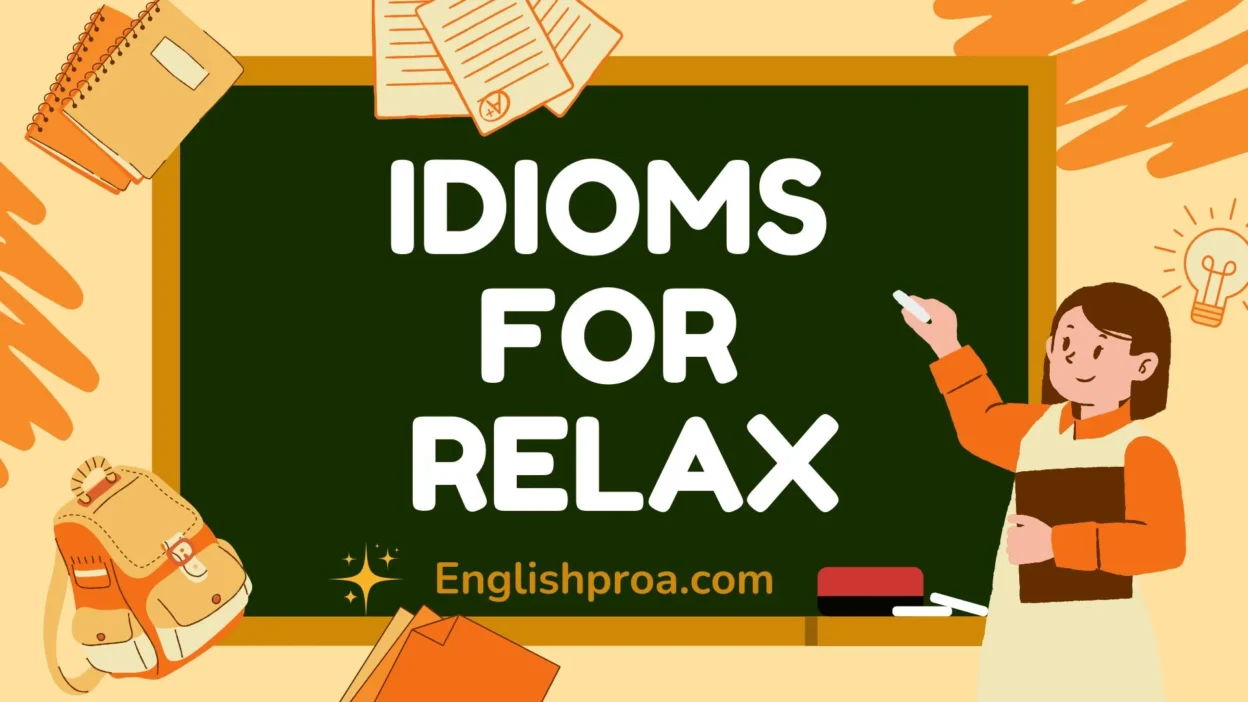In our fast-paced world, it’s easy to forget the importance of relaxation and taking time for yourself. Whether you’re looking for ways to express the need for a breather or trying to convey how peaceful a moment feels, idioms for relaxation can help you communicate with warmth and care.
These idioms not only make your conversations more colorful but also provide meaningful ways to talk about moments of calm, ease, and tranquility. Below are 30 idioms that will help you express the soothing feeling of relaxation in various situations.
1. Take a load off
Meaning: To sit down and relax, often after a period of stress or hard work.
In a sentence: After a long day at the office, I decided to take a load off and enjoy a cup of tea.
Best use: Use this when you want to encourage someone to sit back and relax, especially after a tiring day.
Not use: Avoid using it in formal or business-related contexts.
Other ways to say: Put your feet up, kick back.
2. Kick back
Meaning: To relax and take it easy.
In a sentence: On weekends, I love to kick back with a good book and a warm blanket.
Best use: Ideal for casual conversations when you’re referring to unwinding in a comfortable setting.
Not use: Don’t use in formal settings or when you want to convey focus and activity.
Other ways to say: Unwind, chill out.
3. Put your feet up
Meaning: To relax, especially by sitting with your feet elevated.
In a sentence: After completing all the chores, I finally put my feet up and watched a movie.
Best use: Perfect when you’re suggesting someone take a break or rest after exertion.
Not use: Not appropriate for situations where productivity is expected.
Other ways to say: Take a break, rest.
4. Take it easy
Meaning: To relax and not stress out.
In a sentence: After the hectic meeting, I decided to take it easy for the rest of the day.
Best use: Great for casual, friendly conversations when someone needs to unwind.
Not use: Avoid using it in professional or formal situations where a serious tone is needed.
Other ways to say: Chill out, relax.
5. Let your hair down
Meaning: To relax and enjoy yourself without worrying about what others think.
In a sentence: The weekend getaway was the perfect opportunity to let my hair down and have fun.
Best use: Use it when referring to moments of freedom and letting go of worries.
Not use: Not suitable for professional contexts.
Other ways to say: Unwind, de-stress.
6. Blow off some steam
Meaning: To release pent-up energy or frustration by doing something relaxing or enjoyable.
In a sentence: After the long week at work, I needed to blow off some steam by going for a jog.
Best use: Ideal for situations where you need to release stress in a healthy manner.
Not use: Not appropriate for quiet or peaceful moments.
Other ways to say: Relax, vent.
7. Take a breather
Meaning: To take a short break from something.
In a sentence: Let’s take a breather before we continue with this project.
Best use: Use this when you need a quick pause, especially during busy activities.
Not use: Not suitable for casual rest during social settings.
Other ways to say: Pause, rest.
8. Wind down
Meaning: To gradually relax after a period of activity or stress.
In a sentence: After a long day, I like to wind down by taking a warm bath and listening to calming music.
Best use: Great for describing the end of a busy day or activity.
Not use: Avoid using it when talking about action or energy.
Other ways to say: Unwind, relax.
9. Chill out
Meaning: To relax and not get stressed.
In a sentence: It’s time to chill out and forget about the work for a while.
Best use: Casual, friendly conversations when advising someone to calm down and relax.
Not use: Avoid in more formal conversations.
Other ways to say: Relax, take it easy.
10. Catch some Z’s
Meaning: To take a nap or get some sleep.
In a sentence: I’m going to catch some Z’s before the next meeting.
Best use: Use it humorously or informally when talking about sleep.
Not use: Avoid in formal, professional contexts.
Other ways to say: Sleep, nap.
11. Rest on your laurels
Meaning: To take a break after achieving something, without further effort.
In a sentence: After finishing the big project, I decided to rest on my laurels for a bit.
Best use: Ideal when describing taking a well-earned rest after a significant achievement.
Not use: Don’t use it for routine relaxation or breaks.
Other ways to say: Take a break, relax.
12. On cloud nine
Meaning: To be in a state of perfect happiness or relaxation.
In a sentence: After my vacation, I felt like I was on cloud nine for weeks.
Best use: Use this when describing a feeling of extreme happiness or peace.
Not use: Not useful for regular, everyday relaxation moments.
Other ways to say: In heaven, over the moon.
13. Easy does it
Meaning: Take things slowly and carefully, avoiding rushing.
In a sentence: Easy does it—don’t push yourself too hard during the recovery process.
Best use: When advising someone to relax and approach things gently.
Not use: Don’t use it in high-energy or fast-paced environments.
Other ways to say: Take it slow, don’t rush.
14. Soothe your nerves
Meaning: To calm yourself down after feeling anxious or stressed.
In a sentence: A cup of chamomile tea really helps to soothe my nerves before bed.
Best use: Excellent for moments of anxiety or nervousness when relaxing is needed.
Not use: Not ideal for moments that require high-energy.
Other ways to say: Calm down, de-stress.
15. Have a breather
Meaning: To take a short, refreshing break.
In a sentence: Let’s have a breather before we continue working on the presentation.
Best use: Perfect when you need a quick moment of relaxation.
Not use: Not suitable for long periods of rest.
Other ways to say: Take a break, pause.
16. Float on air
Meaning: To feel extremely light and carefree, often from happiness or relaxation.
In a sentence: After spending the weekend by the beach, I felt like I was floating on air.
Best use: When describing a carefree or lighthearted state of being.
Not use: Not useful in stressful or serious contexts.
Other ways to say: On top of the world, blissful.
17. Sink into the couch
Meaning: To relax deeply, especially after a tiring day.
In a sentence: After a long day of work, I sink into the couch and watch my favorite shows.
Best use: Ideal for informal settings when talking about unwinding at home.
Not use: Avoid in formal or public settings.
Other ways to say: Relax, kick back.
18. Take the edge off
Meaning: To reduce stress or tension.
In a sentence: A good walk in nature can take the edge off a stressful day.
Best use: When discussing ways to relieve stress or anxiety.
Not use: Not appropriate for situations requiring serious action.
Other ways to say: Calm down, relax.
19. Rest easy
Meaning: To feel calm and secure, often used to encourage someone to relax.
In a sentence: Don’t worry about the deadline—rest easy tonight, and we’ll handle it tomorrow.
Best use: Great for reassuring others and helping them feel at ease.
Not use: Don’t use when the situation requires urgency.
Other ways to say: Sleep well, be at peace.
20. Be at peace
Meaning: To feel calm and free from worry.
In a sentence: After practicing meditation, I felt truly at peace with myself.
Best use: When describing a state of emotional or mental relaxation.
Not use: Not suitable for describing temporary moments of rest.
Other ways to say: Calm, serene.
21. Take five
Meaning: To take a short break, usually five minutes.
In a sentence: I’m going to take five before I start the next task.
Best use: Ideal for short, refreshing breaks during work or busy activities.
Not use: Not appropriate for long periods of relaxation.
Other ways to say: Take a quick break, rest.
22. Bask in the moment
Meaning: To fully enjoy or appreciate a calm or happy moment.
In a sentence: I like to bask in the moment when I’m watching a beautiful sunset.
Best use: When talking about enjoying peaceful moments.
Not use: Not suitable for hurried or chaotic situations.
Other ways to say: Enjoy the moment, savor.
23. Take it slow
Meaning: To relax and not hurry.
In a sentence: Let’s take it slow today and enjoy the day without rushing.
Best use: Perfect when encouraging someone to relax and not rush.
Not use: Avoid in situations where quick action is necessary.
Other ways to say: Relax, take your time.
24. Get away from it all
Meaning: To take a break from stress and everyday life.
In a sentence: Sometimes, I just need to get away from it all and spend time in nature.
Best use: Great for describing escapes to peaceful locations or activities.
Not use: Not ideal when you need to focus or be productive.
Other ways to say: Escape, unwind.
25. Let go of stress
Meaning: To release tension or anxiety.
In a sentence: Yoga is a great way to let go of stress and find inner calm.
Best use: When discussing how to manage anxiety or stress.
Not use: Not useful for high-energy or active conversations.
Other ways to say: Relax, calm down.
26. In the zone
Meaning: To be fully focused but in a calm and relaxed manner.
In a sentence: When I’m painting, I get in the zone and forget about everything else.
Best use: When describing a focused state that feels peaceful.
Not use: Not for situations where relaxation is not achieved.
Other ways to say: Focused, calm.
27. Unplug
Meaning: To disconnect from technology and take a break.
In a sentence: I like to unplug from work emails during the weekend and enjoy some quiet time.
Best use: When advising someone to disconnect from their digital life and relax.
Not use: Not for moments when staying connected is essential.
Other ways to say: Disconnect, take a break.
28. Recharge your batteries
Meaning: To rest and regain energy.
In a sentence: After the hectic week, I took the weekend to recharge my batteries.
Best use: Ideal for describing a need for rest to restore energy.
Not use: Avoid using when immediate action is required.
Other ways to say: Refresh, rest.
29. Hit the hay
Meaning: To go to bed and sleep.
In a sentence: I’m exhausted—time to hit the hay.
Best use: Casual conversations when you’re ready to sleep.
Not use: Not suitable for formal or serious contexts.
Other ways to say: Go to bed, sleep.
30. Catch your breath
Meaning: To take a break and rest for a moment.
In a sentence: After running the marathon, I had to catch my breath before I could walk again.
Best use: Great when describing taking a moment to rest after exertion.
Not use: Not appropriate when a longer period of relaxation is needed.
Other ways to say: Rest, pause.
FAQs
1. What is the best idiom for relaxing after a stressful day?
“Take a load off” and “kick back” are both great choices for unwinding after a busy day.
2. Can I use these idioms in formal settings?
These idioms are mostly casual and informal, so it’s best to use them with friends or in relaxed environments.
3. How can I encourage someone to relax using idioms?
You can suggest they “take it easy” or “put their feet up” to help them slow down and de-stress.
4. What does “blow off steam” mean?
It refers to releasing stress or frustration in a way that helps you feel relaxed and at ease.
5. Are these idioms useful for describing both physical and mental relaxation?
Yes, many of these idioms describe both physical relaxation, like “sink into the couch,” and mental relaxation, like “be at peace.”
Conclusion
Learning to express relaxation through idioms is a wonderful way to communicate the importance of unwinding and finding peace in your daily life. Whether you’re sharing with others or reflecting on your own need for rest, these 30 idioms help make the concept of relaxation more vivid and relatable.
By incorporating these phrases into your everyday conversations, you not only make your speech more engaging but also remind yourself and others to slow down, take a breath, and enjoy the calm.





